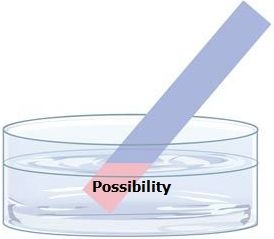|
The first of these two tests is this: whether or not the possibility you got, continues expanding as if all by itself in your own life. Possibility has a way, once gotten, of teasing us to discover it everywhere. Once the distinction possibility is fully gotten, it can easily be discovered in places where nothing was possible before. The question is: is it you discovering possibility in places where nothing was possible before? ... or ... is it that possibility is showing up in places where nothing was possible before?
You could say it's either or both. In fact each are accurate, and each demonstrates the hallmark of bringing forth possibility ie its yardstick if you will: when possibility is gotten then deployed ie when possibility is used up, what results is more possibility not less. Possibility defies the laws of physics. You can't deplete it. It doesn't come in finite quantities. It's endless, vast, unbounded.
The second test for whether or not what you got is real possibility, is this: if it continues expanding as if all by itself in others' lives. Be careful: I don't mean whether or not, when others get possibility independently, it continues expanding as if all by itself in their lives, because that's bound to happen just as it did in yours. No, I'm referring to whether or not, when possibility shows up in your life as a result of you having gotten it, it then shows up in others' lives as a result of you speaking it. That's not as far-fetched as it may seem: if you look at your own experience, you'll notice possibility showed up in your life as a result of someone else speaking it. In this regard, a Lao Tzu dictum "Those who know don't say, and those who say don't know" at best isn't apropos inventing possibility, and at worse may be missing it.
